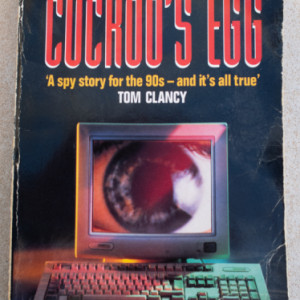Inspiration
In my teens I was a total geek (some might say I still am) in the techy sense rather than the sci-fi sense. I built things from electronics, I had a soldering iron at about 12, and I got my Amateur Radio license at the earliest age possible (14), passing the required City and Guilds exam containing quite a lot of electronics and physics long before my standard grades. I also played with computers – we had a Sinclair Spectrum at home which I programmed in Sinclair Basic and Z80 assembler. Later I started playing with my Dad’s PC, in 8086 assember (I couldn’t afford a compiler, so I had to use the “debug” – a utility built in to DOS that doubled as an assembler).
Sometime around 1990 I read a book called “The Cuckoo’s Egg”. It’s a fascinating story about how an astronomer running computer systems for a lab, Clifford Stoll, traces a hacker that was attacking their systems from half a world away. This at a time when no-one else was doing anything even remotely similar – he was blazing a trial for what became a whole industry. For a teenager already fascinated by the guts of computer systems, it introduced the glamour of real operating systems (VMS, Unix) and the idea of computers talking to each other around the globe. It also valued curiosity and techy skills in way that was really exciting to me. I had incredibly supportive parents, but they were both historians (although my Mum was also a lawyer by that time) and were baffled by the world I was fascinated by (“baffled” is the word they use – so I don’t think I’m speaking out of turn).
My well thumbed copy is pictured in the Extras.
A few years later I went to University to study Computer Science and Electronics and I got my hands on Unix systems connected to the internet, and could finally play with things like Email, Telnet, FTP, Gopher and Kermit that I had read about in the Cuckoo’s Egg.
It’s a book I have read many, many times, and lent to many other people. These days I work (at least at the edges of) the discipline now known as Cybersecurity, and I have recommended the book as a primer for a few people interested in the sector – the fundamentals haven’t changed since it was written and it offers very relevant insight into the game of cat and mouse played by hacker and systems administrator. In fact, every day I use concepts (such as hashing passwords) that I learned from that book.
Earlier this year I was reading about Klein Bottles – fascinating geometrical constructs that occupy zero volume and have a single surface – there is no top, bottom, inside or outside and it has no edges. In four dimensions they make perfect sense, and it’s possible to build representations in three dimensions although you have to cheat slightly allowing them to intersect themselves.
While following random internet links I stumbled across a reference to Clifford Stoll selling blown glass Klein bottles and I knew immediately I had to have one. There’s something about his dedicated pursuit of intellectual curiosity that made it feel quite natural to me that he ended up selling Klein bottles as a hobby (he no longer makes them himself – but he used to). He even sent me a lovely note and we exchanged a couple of e-mails (he’s as funny as his writing in his book suggests).
If you’re interested, you can buy a Klein bottle from Clifford Stoll’s ACME Klein Bottle site, or you can watch him giving a TED talk about the call to learn (and how we SHOULD teach science). Or even better, buy and read the Cuckoo’s Egg.
My Klein bottle (in case you haven’t figured it out, that’s the main blip!) now sits on my desk to remind me of the value of persistent curiosity.


Comments
Sign in or get an account to comment.


